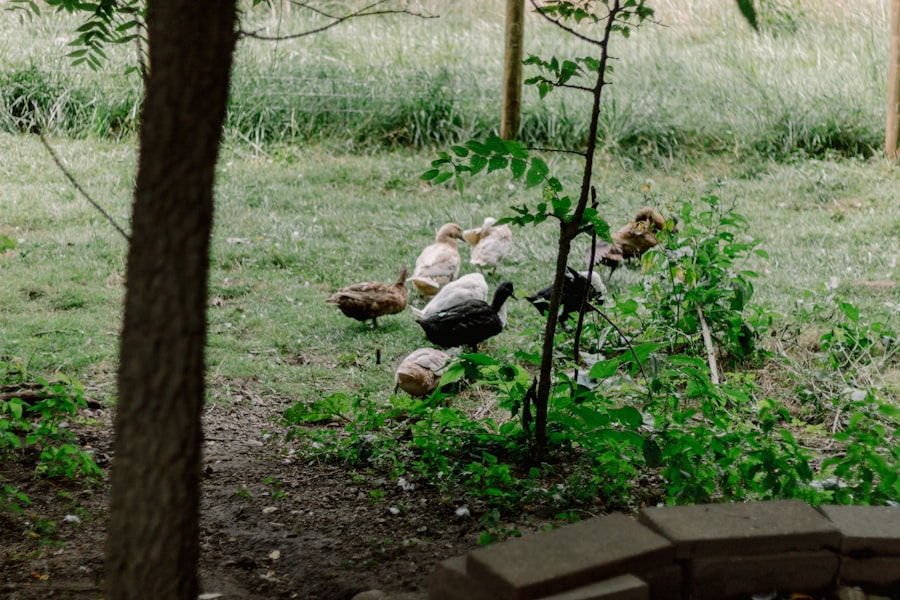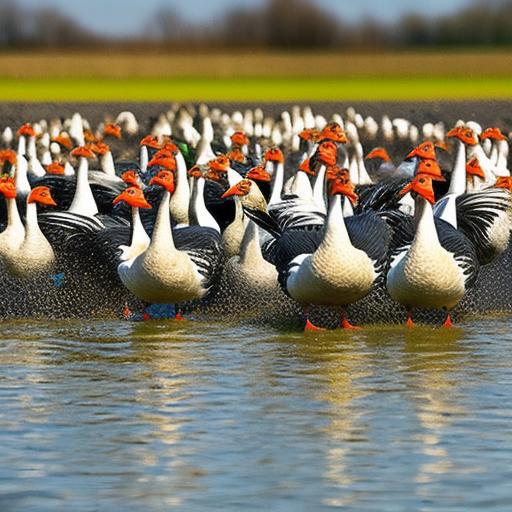Keeping geese for profit is a lucrative and rewarding venture that has gained popularity in recent years. Geese farming involves raising geese for various purposes, such as meat, eggs, feathers, and even as pets. Geese are known for their hardiness, adaptability, and high productivity, making them an ideal choice for those looking to start a profitable farming business.
There are several reasons why keeping geese for profit is a good idea. Firstly, there is a high demand for goose products in the market. Goose meat is considered a delicacy in many cultures and is in high demand during festive seasons. Goose eggs are also sought after for their rich flavor and nutritional value. Additionally, goose feathers are used in various industries, including fashion and bedding.
Furthermore, geese are low maintenance and cost-effective animals to raise. They are excellent grazers and can feed on grass and other vegetation, reducing the need for expensive feed. Geese also require minimal housing and can adapt to different climates and environments. This makes them an ideal choice for small-scale farmers or those with limited resources.
Lastly, keeping geese for profit is a sustainable and eco-friendly practice. Geese are natural grazers and can help control weeds and pests in the fields. They also produce high-quality manure that can be used as fertilizer, reducing the need for chemical inputs. By raising geese, farmers can contribute to sustainable agriculture practices and promote environmental conservation.
Key Takeaways
- Keeping geese can be a profitable venture for farmers and entrepreneurs.
- Raising geese can provide a variety of benefits, including meat, eggs, feathers, and weed control.
- Choosing the right breed of geese is important for maximizing profitability.
- Setting up a geese farm requires careful planning and consideration of factors such as housing, fencing, and water sources.
- Proper feeding and nutrition, as well as health and disease management, are crucial for successful and profitable geese farming.
Benefits of Raising Geese for Profit
There are numerous benefits to raising geese for profit. One of the main advantages is the high demand for goose products in the market. Goose meat is known for its rich flavor and tenderness, making it a popular choice for special occasions and festive meals. Goose eggs are also highly sought after for their nutritional value and unique taste. Additionally, goose feathers are used in various industries, including fashion and bedding.
Another benefit of raising geese for profit is that they are low maintenance and cost-effective animals. Geese are excellent grazers and can feed on grass and other vegetation, reducing the need for expensive feed. They also require minimal housing and can adapt to different climates and environments. This makes them an ideal choice for small-scale farmers or those with limited resources.
Furthermore, raising geese for profit is a sustainable and eco-friendly practice. Geese are natural grazers and can help control weeds and pests in the fields. They also produce high-quality manure that can be used as fertilizer, reducing the need for chemical inputs. By raising geese, farmers can contribute to sustainable agriculture practices and promote environmental conservation.
Choosing the Right Goose Breed for Profitability
When it comes to choosing the right goose breed for profitability, there are several factors to consider. Popular goose breeds for farming include Toulouse, Embden, Chinese, and African. Each breed has its own unique characteristics and is suitable for different purposes, such as meat production, egg-laying, or feather production.
When choosing a breed, it is important to consider factors such as climate, available resources, market demand, and personal preferences. Some breeds are better suited for cold climates, while others thrive in warmer regions. It is also important to consider the market demand for specific goose products in your area. For example, if there is a high demand for goose meat, it would be wise to choose a breed that is known for its meat production capabilities.
For meat production, breeds such as Toulouse and Embden are popular choices. These breeds are known for their large size and excellent meat quality. For egg-laying purposes, Chinese and African breeds are preferred due to their high egg production capabilities. If you are interested in feather production, Chinese geese are known for their abundant and high-quality feathers.
Setting Up a Geese Farm for Profit
Setting up a geese farm for profit requires careful planning and consideration. The first step is to find a suitable location for your farm. Geese require ample space to roam and graze, so it is important to have enough land available. The location should also have access to clean water sources, as geese require regular access to water for drinking and bathing.
Once you have found a suitable location, you will need to set up housing and equipment for your geese. Geese can be housed in simple structures such as sheds or barns, as long as they provide protection from predators and the elements. It is important to provide enough space for the geese to move around comfortably and access to nesting areas for egg-laying.
In terms of equipment, you will need feeding and watering systems, as well as fencing or netting to keep the geese contained. It is also important to have proper ventilation in the housing area to prevent respiratory issues. Additionally, you may need equipment for egg collection, incubation, and hatching if you plan on breeding geese.
Before starting your geese farm, it is important to check the legal requirements and permits needed in your area. Some regions may have specific regulations regarding the keeping of livestock or poultry, so it is important to comply with these regulations to avoid any legal issues.
Feeding and Nutrition for Profitable Geese Farming
Feeding and nutrition play a crucial role in profitable geese farming. Geese have specific nutritional requirements that need to be met in order for them to grow and produce efficiently. It is important to provide a balanced diet that includes a combination of pasture, grains, and supplements.
Geese are natural grazers and can feed on grass and other vegetation. Providing access to pasture or grazing areas is essential for their overall health and well-being. However, it is important to ensure that the pasture is free from toxic plants or chemicals that could harm the geese.
In addition to grazing, geese also require a grain-based diet to meet their energy and protein needs. A commercial poultry feed that is specifically formulated for geese can be used as a supplement to the pasture. The feed should contain a balanced mix of grains, vitamins, and minerals to support optimal growth and production.
Supplements such as oyster shell or grit should also be provided to help with digestion and eggshell formation. Fresh, clean water should be available at all times for drinking and bathing.
It is important to establish a feeding schedule and management plan for your geese. Feeding should be done at regular intervals to ensure that the geese are receiving enough nutrients. Overfeeding or underfeeding can lead to health issues and decreased productivity.
Health and Disease Management in Geese Farming

Maintaining the health of your geese is essential for profitable farming. Geese are generally hardy animals, but they can still be susceptible to certain health issues and diseases. It is important to implement preventive measures and have a plan in place for disease management.
Common health issues in geese include respiratory infections, parasites, and nutritional deficiencies. Respiratory infections can be caused by poor ventilation or exposure to cold and damp conditions. Regular cleaning of the housing area and providing proper ventilation can help prevent respiratory issues.
Parasites such as mites and worms can also affect the health of geese. Regular inspection and treatment for parasites are necessary to keep your geese healthy. This can be done through the use of appropriate medications or natural remedies.
Nutritional deficiencies can occur if the geese are not receiving a balanced diet. It is important to provide a diet that meets their nutritional requirements and supplement with vitamins or minerals if necessary. Regular monitoring of the geese’s body condition and overall health can help identify any nutritional deficiencies early on.
Vaccinations are also an important part of disease management in geese farming. Consult with a veterinarian to determine the appropriate vaccination schedule for your geese. Vaccinations can help prevent common diseases such as avian influenza and Newcastle disease.
In case of any health issues or emergencies, it is important to have access to veterinary care. Establish a relationship with a local veterinarian who has experience with poultry or livestock to ensure prompt and effective treatment.
Breeding and Hatching Geese for Profit
Breeding and hatching geese can be a profitable aspect of geese farming. Geese are seasonal breeders, with the breeding season typically occurring in the spring. During this time, the geese will mate and lay eggs.
To encourage successful breeding, it is important to provide a suitable environment for the geese. This includes providing nesting areas and ensuring that the geese have enough space and privacy for mating. It is also important to provide a balanced diet and proper nutrition to support the breeding process.
Once the geese have mated, the female will lay eggs in the nesting area. Geese typically lay one egg every two days until they have laid a clutch of eggs. The eggs should be collected daily to prevent them from getting dirty or damaged.
To hatch the eggs, they can either be incubated artificially or left with the female goose for natural incubation. Artificial incubation involves placing the eggs in an incubator set at the appropriate temperature and humidity levels. Natural incubation involves leaving the eggs with the female goose, who will sit on them to keep them warm until they hatch.
The incubation period for goose eggs is approximately 28-35 days. During this time, it is important to monitor the temperature and humidity levels to ensure optimal conditions for hatching. Once the goslings hatch, they should be provided with a warm and safe environment and given proper care and nutrition.
Marketing and Selling Geese Products for Profit
Marketing and selling geese products is an important aspect of running a profitable geese farm. It is important to identify your target market and customer base and tailor your products and marketing strategies accordingly.
One of the main factors to consider when marketing geese products is the local demand and preferences. Research the market to determine the demand for goose meat, eggs, or feathers in your area. This can be done through surveys, market research, or by talking to local restaurants, retailers, or individuals.
Once you have identified your target market, you can start developing your product options and pricing strategies. For example, if there is a high demand for goose meat, you can focus on selling whole birds or specific cuts of meat. If there is a demand for goose eggs, you can offer them as a specialty product or sell them in bulk to local bakeries or restaurants.
In terms of pricing, it is important to consider factors such as production costs, market demand, and competition. Set prices that are competitive yet profitable for your business. Consider offering discounts or promotions to attract new customers or encourage repeat business.
When it comes to sales channels, there are several options to consider. You can sell directly to consumers through farmers markets, roadside stands, or online platforms. You can also establish partnerships with local restaurants, retailers, or wholesalers to sell your products in larger quantities.
Promotion tactics such as social media marketing, advertising in local publications, or participating in community events can help raise awareness about your geese products and attract customers. It is important to have a strong brand identity and communicate the unique qualities of your products to differentiate yourself from competitors.
Financial Planning and Management for Profitable Geese Farming
Financial planning and management are crucial for running a profitable geese farm. It is important to have a clear understanding of your budget, revenue projections, and profit margins.
Start by creating a budget that outlines your expected expenses and income. Consider factors such as land and equipment costs, feed and supplies, veterinary care, marketing expenses, and labor costs. It is important to be realistic and conservative when estimating expenses to avoid any surprises.
Next, project your revenue based on the expected sales of your geese products. Consider factors such as market demand, pricing strategies, and production capabilities. It is important to have a clear understanding of your profit margins and break-even point to ensure that your business is financially viable.
Record-keeping is an essential part of financial management for geese farming. Keep track of all your expenses and income to monitor the financial health of your business. This can be done through simple spreadsheets or by using specialized software or apps.
It is also important to regularly review and analyze your financial records to identify any areas for improvement or cost-saving opportunities. This can help you make informed decisions about your business and adjust your strategies as needed.
Challenges and Solutions in Keeping Geese for Profit
Keeping geese for profit comes with its own set of challenges. It is important to be prepared and have solutions in place to overcome these challenges.
One of the main challenges in geese farming is weather and environmental factors. Geese are generally hardy animals, but extreme weather conditions such as heatwaves or cold snaps can affect their health and productivity. Providing proper shelter, ventilation, and access to clean water can help mitigate the effects of extreme weather.
Predators can also pose a threat to geese farms. Common predators include foxes, raccoons, coyotes, and birds of prey. Implementing security measures such as fencing, netting, or guard animals can help protect your geese from predators.
Labor and time management can also be a challenge in geese farming. Raising geese requires regular care and attention, including feeding, watering, cleaning, and monitoring their health. It is important to have a schedule and plan in place to ensure that all tasks are completed in a timely manner. Consider hiring additional help or delegating tasks to family members or employees if needed.
Overall, the key to overcoming challenges in geese farming is to be proactive and prepared. Regularly assess your farm’s needs and make adjustments as necessary. Seek advice from experienced farmers or industry professionals who can provide guidance and support.
Keeping geese for profit is a rewarding and profitable venture that offers numerous benefits. Geese farming provides high-quality products such as meat, eggs, and feathers that are in high demand in the market. Geese are low maintenance and cost-effective animals to raise, making them an ideal choice for small-scale farmers or those with limited resources. Additionally, geese farming is a sustainable and eco-friendly practice that promotes environmental conservation.
When starting a geese farm for profit, it is important to choose the right goose breed based on your specific goals and market demand. Setting up the farm requires careful planning and consideration of factors such as location, housing, and legal requirements. Feeding and nutrition play a crucial role in profitable geese farming, and it is important to provide a balanced diet that meets their nutritional requirements. Health and disease management are also important aspects of geese farming, and preventive measures should be implemented to ensure the health of the geese.
Breeding and hatching geese can be a profitable aspect of geese farming, and it is important to provide a suitable environment for successful breeding. Marketing and selling geese products require identifying your target market and understanding their preferences. Some potential target markets for geese products include restaurants, specialty food stores, and individuals interested in sustainable and locally sourced meat. Conducting market research can help determine the demand for geese products in your area and allow you to tailor your marketing strategies accordingly. Additionally, building relationships with potential buyers and attending local farmers markets or trade shows can help promote your geese products and increase sales.
If you’re interested in keeping geese for profit, you may also want to check out this informative article on Poultry Wizard’s website about what geese can eat. It provides valuable insights into whether geese can eat chicken feed and offers helpful tips on feeding geese for optimal health and productivity. To learn more, click here: Can Geese Eat Chicken Feed? Additionally, if you’re considering setting up a garden chicken coop to maximize your poultry operation, Poultry Wizard has a great article on that too. Find out how to create a functional and efficient garden chicken coop by clicking here: Garden Chicken Coop. Lastly, if you’re in need of inspiration for building a chicken coop, Poultry Wizard has compiled a list of ten amazing chicken coop designs that you can explore here: Chicken Coop Designs. Happy reading and successful goose farming!
FAQs
What is the purpose of keeping geese for profit?
Geese can be kept for profit for their meat, eggs, feathers, and down. They are also used for weed control and as guard animals.
What are the benefits of keeping geese for profit?
Keeping geese for profit can provide a source of income, as well as a sustainable and organic source of food. Geese are also low-maintenance animals and can be raised on small farms or homesteads.
What are the challenges of keeping geese for profit?
Some challenges of keeping geese for profit include the need for adequate space, protection from predators, and proper nutrition. Geese can also be noisy and messy, which may not be suitable for all environments.
What is the best breed of geese for profit?
The best breed of geese for profit depends on the specific purpose. For meat production, the Embden and Toulouse breeds are popular choices. For egg production, the Chinese and African breeds are commonly used. The Emden breed is also known for its high-quality feathers and down.
What is the lifespan of a goose?
The lifespan of a goose can vary depending on the breed and living conditions. On average, geese can live up to 20 years.
What is the ideal living environment for geese?
Geese require access to water for swimming and drinking, as well as adequate space for grazing and nesting. They also need protection from predators and extreme weather conditions. A fenced-in pasture or pond area with a shelter is ideal for geese.
What is the feeding requirement for geese?
Geese require a balanced diet of grains, greens, and protein. They can be fed commercial feed or a homemade mixture of grains, such as corn and wheat, along with fresh greens and insects. It is important to provide clean water at all times.
Meet Walter, the feathered-friend fanatic of Florida! Nestled in the sunshine state, Walter struts through life with his feathered companions, clucking his way to happiness. With a coop that’s fancier than a five-star hotel, he’s the Don Juan of the chicken world. When he’s not teaching his hens to do the cha-cha, you’ll find him in a heated debate with his prized rooster, Sir Clucks-a-Lot. Walter’s poultry passion is no yolk; he’s the sunny-side-up guy you never knew you needed in your flock of friends!







